
Whether people are shopping online, searching for information, or browsing casually for fun, they want the websites they visit to load quickly. People don’t have patience for long loading times anymore because these days, everything is instant. Your website should be no different.
Just under half of website visitors expect the page to load in less than two seconds, and 40% will leave the page if it takes more than three seconds to load. Of course, you want people to spend as much time on your website as possible, so the last thing you want is for them to bounce off immediately because of slow load times. Here are five ways to help ensure your website loads quickly.
1. Build it using a responsive theme
Your website’s theme takes up quite a bit of bandwidth, and if it has to load a different theme with different aspect ratios for each device, it can take longer to load. Cut out this extra buffering time by using a responsive theme for your website. Your web pages will load and render efficiently, and will be automatically optimized for the different platforms and sizes required for each.
There are plenty of pre-built templates that are responsive, but if you’re starting from scratch and coding your own, keep in mind how the content should be displayed and build in around that, rather than trying to fit content into a design. Create wide and narrow skeleton viewports to get an idea of how it will look first.
2. Use a reliable hosting provider
Your website hosting provider can help speed up the load times of your website, so you want to make sure you’re using a reliable provider. If your website is loading slowly, a new hosting package may be a quick solution. Your site could be sharing server space with many other companies, and since you’re all using the same server, your load speeds could be affected. krystal.uk is an example of a web host that puts your site on your own “private cloud” server to ensure rapid connection.
3. Use a caching plugin
Browser caching speeds up page loading times significantly because it stores cached versions of your static web pages. When someone visits your site, the browser won’t need to request a pull from the server, but instead displays the cached version. The fewer server requests your browser makes, the faster your website loads.
4. Evaluate other plugins
Speaking of plugins, if you have too many of them, they can bog down your website and slow it down. Poor quality or outdated plugins can also slow down website performance, so go through your list of plugins and remove any that are redundant, outdated, or no longer useful to you. You’ll notice an immediate bump in loading speed after doing so.
5. Optimize images for web and combine them
Having images with file sizes that are too large will dramatically slow down your site’s loading time. Make sure all images are optimized for web and compressed (without hurting the quality) so that they load quickly when someone visits. Additionally, you can combine your images into CSS sprites so instead of forcing multiple server requests to load images separately.
Chicano | Fighting/Writing for Diversity | DM since 08 | Anime Lover | Site: https://www.thegeeklyfe.com | info@thegeeklyfe.com | http://twitch.tv/that_deangelo | https://linktr.ee/deangelomurillo




